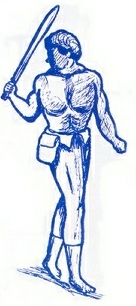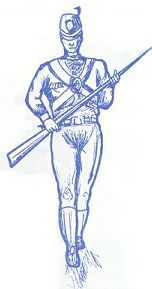|
||||||||||||||||||||||||||||||||||||
| Home > Info Centre > Publications > Alert 1998 > Those of Old | ||||||||||||||||||||||||||||||||||||
|
|
Maybe this article should be titled Reflections, as its central theme is the past, or just Rumblings, as it is perhaps the rumblings of one man, who sees the Jamaica Military along a continuum made up of the soul of every Jamaican, who had the courage to bear arms in the name of his country. Whatever the title, this article is about us – members of the Military, our past and more importantly our future. We often take for granted, the systems we inherit; the structures that tower over us; the people gone before us; and the legacy bestowed upon us. It is that legacy that we must seek to define; to understand and to replicate. The secrets in which our past is rooted, the drums of our ancestors, the sound of the abeng and bugle of that era. That past, indeed our past, is not truncated, or a hodgepodge of episodes as we are often led to believe, but rather it is like fertile valley, hidden, but nevertheless fertile. The past of which we speak is rich in heroics; the indomitable spirit of the Maroons, and the exemplary conduct and heroism displayed by members of the West India Regiment. Our forebearers have set a fitting example, that we must emulate. In a time when they were denied freedom, they distinguished themselves and triumphed. The skill and cunning of Captain Cudjoe and the courage and tenacity of Nanny, as Military Commanders, can compare to any distinguished General of the same era. Despite serving under Colonial fetters, the West India Regiment served with a sense of probity and courage that could only be that of a people who understood order and process. Order and process are intrinsic to our past, thankfully contemporary writings of history have refuted many of the myths of chaos and savagery. Our past now serves as a source of enrichment. Militarily, the experience of our ancestors served to inform our European colonizers, for example in the case of the English, the Maroons did prove a worthy adversary. The English also made a significant contribution to the legacy, as many of our structures, and the codification of military procedures and drills were founded on their system. We must seek to use the collective experiences of our ancestors and colonizers to assist us in tackling today’s problems.
In today’s world of Cyberspace and virtual reality, the spectre of lack of funding, relevance, indiscipline and apathy, hover at our gates – the Army is under siege. However, despite the many ‘pundits’ predicting doom, we too must bequeath a legacy, and it must be no less than that left behind by those of old. Our legacy must be in the quality of the lowest common denominator of all great institutions, all great cultures, all great states and all great nations. That common denominator, that is almost always forgotten – the human factor. There must be continued efforts at finding creative ways of ensuring that individuals are trained in all disciplines and at all levels. The investment for the new millennium must be in the improvement of the human factor, in the inculcating of common values, in the creation of a philosophy that is rooted in our ancestral past, and in the forging of an ethos that guarantees our survival. For we, near old, this must be our legacy.
|
|||||||||||||||||||||||||||||||||||
|
|
||||||||||||||||||||||||||||||||||||


